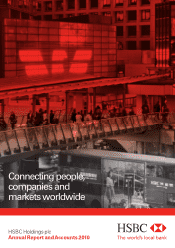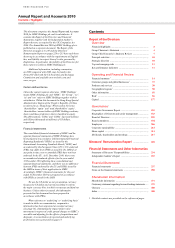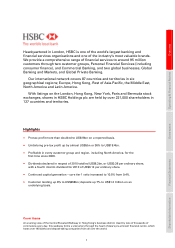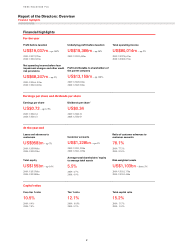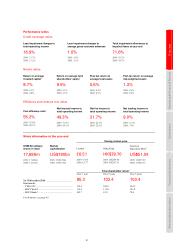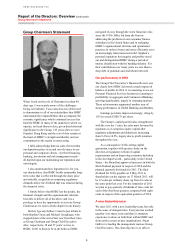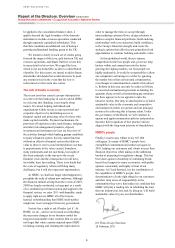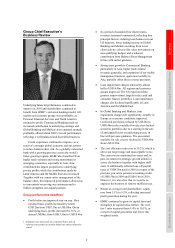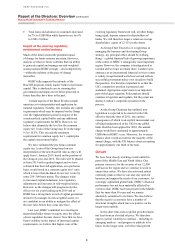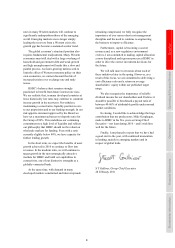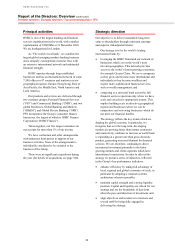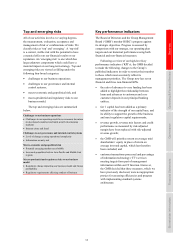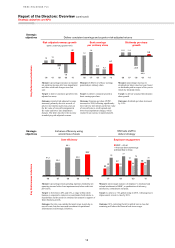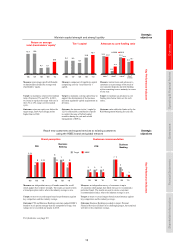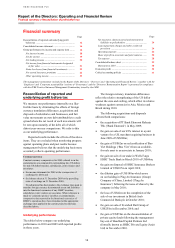HSBC 2010 Annual Report Download - page 7
Download and view the complete annual report
Please find page 7 of the 2010 HSBC annual report below. You can navigate through the pages in the report by either clicking on the pages listed below, or by using the keyword search tool below to find specific information within the annual report.
5
Overview Operating & Financial Review Governance Financial Statements Shareholder Information
sustainable long-term value for shareholders
consistently in a manner that maintains the
confidence of all other key stakeholders in our
businesses including depositors, counterparties,
long-term creditors, customers, employees,
regulators and governments. His review on pages 7
to 9 gives an insight into his immediate priorities.
Everything we do is governed by the imperative
of upholding HSBC’s corporate reputation and
character at the highest level and adding further
strength to our brand; we deeply regret that a number
of weaknesses in regulatory compliance were
highlighted in 2010 and we are resolved to remedy
these and reinforce the high standards we demand of
ourselves.
For my part, I shall be focusing on engaging at
the highest level in the regulatory reform debates
that will, in large part, shape our future. I shall also
lead the Board in the stewardship and review of
performance of our financial and human resources.
In the interest of full transparency, we have
today published on our website the respective roles
and responsibilities of the Group Chairman, the
Deputy Chairman and Senior Independent Director
and the Group Chief Executive.
Board changes
I have already paid tribute to the contributions of
Stephen Green and Michael Geoghegan. Vincent
Cheng has indicated that he will step down at the
next AGM and on behalf of the Board I want to
thank him for his immense contribution in many
roles over 33 years. Vincent will retain an
association with the Group by taking on an advisory
role to the Group Chief Executive on regional
matters. Laura Cha will join the Board on 1 March;
Laura has been Deputy Chair of The Hongkong and
Shanghai Banking Corporation Limited for four
years and brings a wealth of experience of China;
fuller details of her background and experience are
set out in the Directors’ Report.
Regulatory update
There was much progress made during 2010 on the
regulatory reform agenda. Although there is still a
great deal to do, the shape of capital requirements
was broadly clarified and an implementation
timetable stretching out to 2019 was agreed to allow
time for the industry to adjust progressively. A
minimum common equity tier 1 ratio of 7%,
including a capital conservation buffer, has been
agreed. HSBC already meets this threshold
requirement. The Group Chief Executive’s Business
Review addresses how these revised requirements
will impact our targeted return on equity.
During 2011, the debate will be dominated by
consideration of the calibration of minimum liquidity
standards. Although it is clear that liquidity and
funding weaknesses were key elements contributing
to the crisis, HSBC agrees with the industry consensus
that the revised requirements in these areas are
overly conservative and could lead to unnecessary
deleveraging at a time of fragile economic recovery
in much of the developed world. It will be a near
impossibility for the industry to expand business
lending at the same time as increasing the amount of
deposits deployed in government bonds while, for
many banks but not HSBC, reducing dependency on
central bank liquidity support arrangements. It is to
be hoped that the observation period, which starts
this year and precedes the formal introduction of the
new requirements, will inform a recalibration of
these minimum liquidity standards.
A second debate of importance to HSBC’s
shareholders in 2011 will concern the designation
of ‘Systemically Important Financial Institutions’
(‘SIFI’s). Consideration is being given in the
regulatory community to mandating higher capital
requirements, together with more intense
supervision, for institutions classified as SIFIs. We
agree with heightened supervision but it is not clear
that the reduced shareholder returns that would
follow the imposition of incremental capital would
be compensated for by improved stability.
Classification as a SIFI with a requirement to hold
incremental capital would, however, probably lead
others to favour SIFIs as counterparties, and may
therefore have the unintended consequence of further
concentrating the industry.
HSBC’s position is that systemic importance
should not be determined by size alone. It is clear,
however, that, on almost any basis, HSBC would be
classified as systemically important. For this reason
we are engaging fully in the debate around the
consequences of designation as a SIFI. In particular,
we draw attention to the benefits of our corporate
organisation through separate subsidiaries in
mitigation against the imposition of incremental
capital for SIFIs based on size alone.
In October 2010, the UK government confirmed
its intention to raise the sum of £2.5bn (US$3.9bn)
through a levy on bank balance sheets, and recently
announced it will accelerate the full impact of this
levy to 2011. We take no issue with the right of the
UK government to raise a levy on the banking
industry, particularly when having had to risk
taxpayers’ money to rescue a number of important
UK institutions. However, as the proposed levy is to

